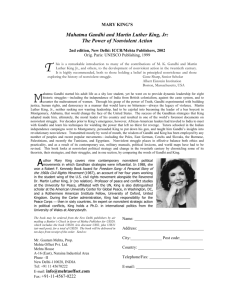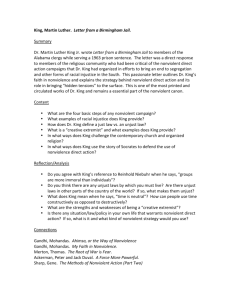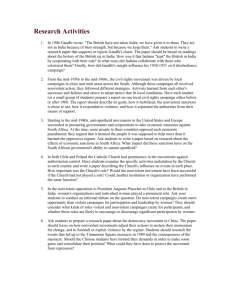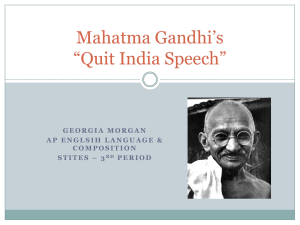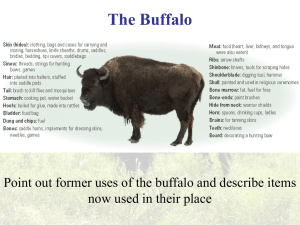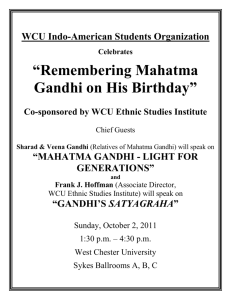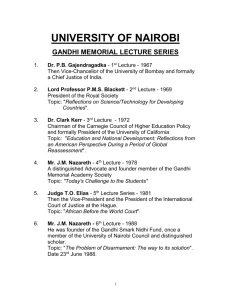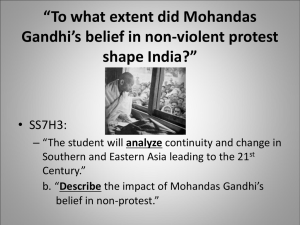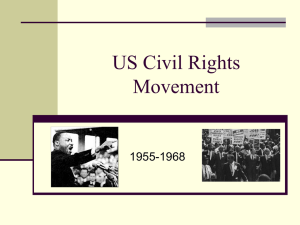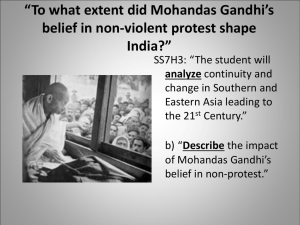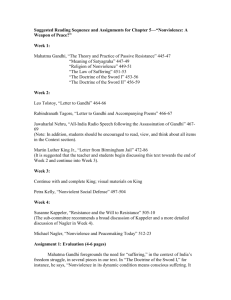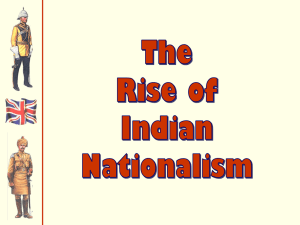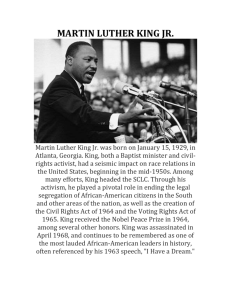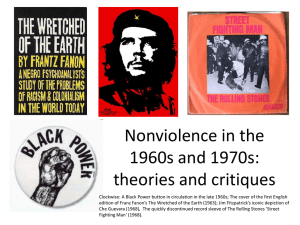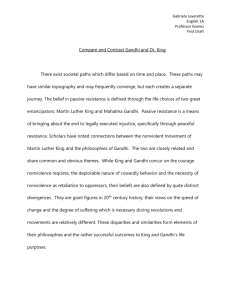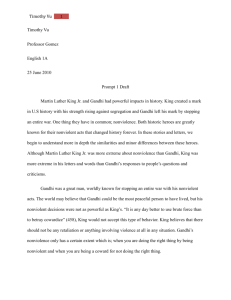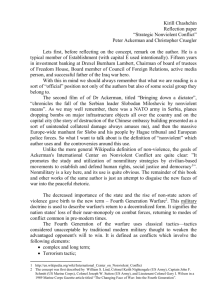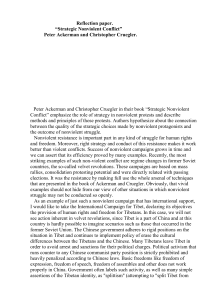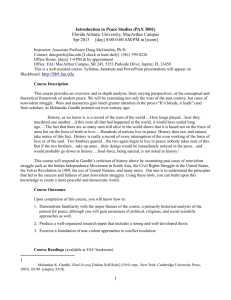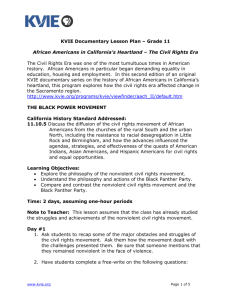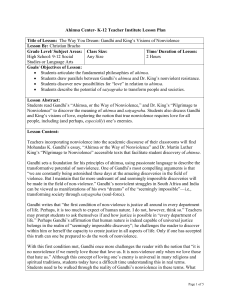Book Order Form ()
advertisement
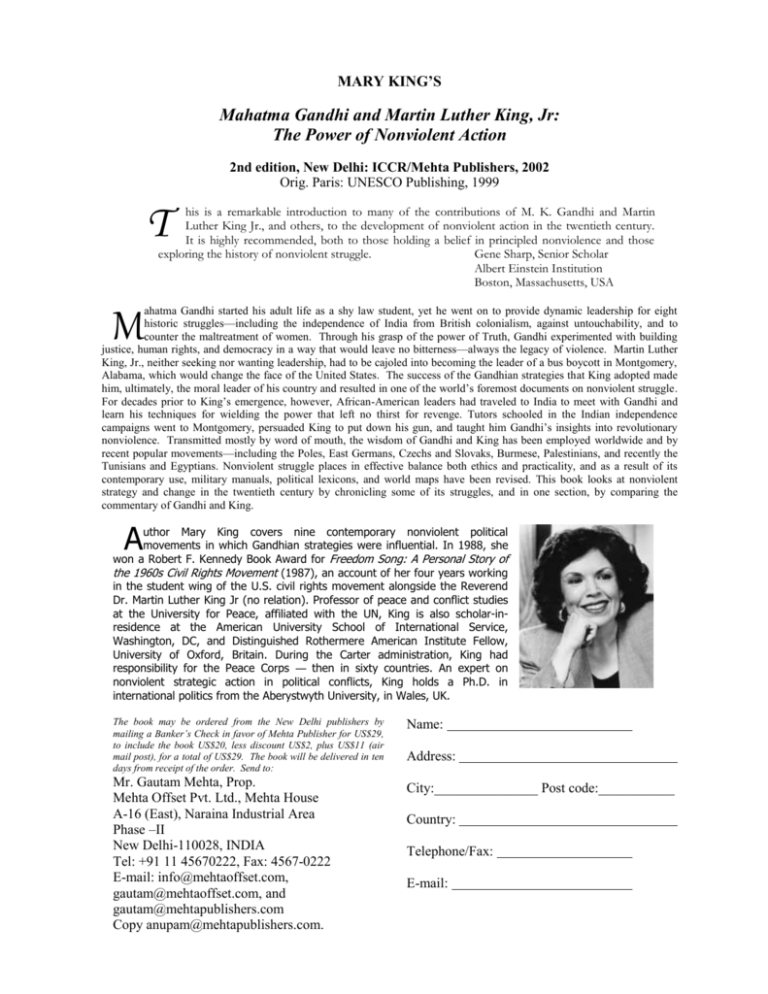
MARY KING’S Mahatma Gandhi and Martin Luther King, Jr: The Power of Nonviolent Action 2nd edition, New Delhi: ICCR/Mehta Publishers, 2002 Orig. Paris: UNESCO Publishing, 1999 T his is a remarkable introduction to many of the contributions of M. K. Gandhi and Martin Luther King Jr., and others, to the development of nonviolent action in the twentieth century. It is highly recommended, both to those holding a belief in principled nonviolence and those exploring the history of nonviolent struggle. Gene Sharp, Senior Scholar Albert Einstein Institution Boston, Massachusetts, USA M ahatma Gandhi started his adult life as a shy law student, yet he went on to provide dynamic leadership for eight historic struggles—including the independence of India from British colonialism, against untouchability, and to counter the maltreatment of women. Through his grasp of the power of Truth, Gandhi experimented with building justice, human rights, and democracy in a way that would leave no bitterness—always the legacy of violence. Martin Luther King, Jr., neither seeking nor wanting leadership, had to be cajoled into becoming the leader of a bus boycott in Montgomery, Alabama, which would change the face of the United States. The success of the Gandhian strategies that King adopted made him, ultimately, the moral leader of his country and resulted in one of the world’s foremost documents on nonviolent struggle. For decades prior to King’s emergence, however, African-American leaders had traveled to India to meet with Gandhi and learn his techniques for wielding the power that left no thirst for revenge. Tutors schooled in the Indian independence campaigns went to Montgomery, persuaded King to put down his gun, and taught him Gandhi’s insights into revolutionary nonviolence. Transmitted mostly by word of mouth, the wisdom of Gandhi and King has been employed worldwide and by recent popular movements—including the Poles, East Germans, Czechs and Slovaks, Burmese, Palestinians, and recently the Tunisians and Egyptians. Nonviolent struggle places in effective balance both ethics and practicality, and as a result of its contemporary use, military manuals, political lexicons, and world maps have been revised. This book looks at nonviolent strategy and change in the twentieth century by chronicling some of its struggles, and in one section, by comparing the commentary of Gandhi and King. A uthor Mary King covers nine contemporary nonviolent political movements in which Gandhian strategies were influential. In 1988, she won a Robert F. Kennedy Book Award for Freedom Song: A Personal Story of the 1960s Civil Rights Movement (1987), an account of her four years working in the student wing of the U.S. civil rights movement alongside the Reverend Dr. Martin Luther King Jr (no relation). Professor of peace and conflict studies at the University for Peace, affiliated with the UN, King is also scholar-inresidence at the American University School of International Service, Washington, DC, and Distinguished Rothermere American Institute Fellow, University of Oxford, Britain. During the Carter administration, King had responsibility for the Peace Corps ― then in sixty countries. An expert on nonviolent strategic action in political conflicts, King holds a Ph.D. in international politics from the Aberystwyth University, in Wales, UK. The book may be ordered from the New Delhi publishers by mailing a Banker’s Check in favor of Mehta Publisher for US$29, to include the book US$20, less discount US$2, plus US$11 (air mail post), for a total of US$29. The book will be delivered in ten days from receipt of the order. Send to: Mr. Gautam Mehta, Prop. Mehta Offset Pvt. Ltd., Mehta House A-16 (East), Naraina Industrial Area Phase –II New Delhi-110028, INDIA Tel: +91 11 45670222, Fax: 4567-0222 E-mail: info@mehtaoffset.com, gautam@mehtaoffset.com, and gautam@mehtapublishers.com Copy anupam@mehtapublishers.com. Name: Address: City:_______________ Post code:___________ Country: Telephone/Fax: E-mail:
